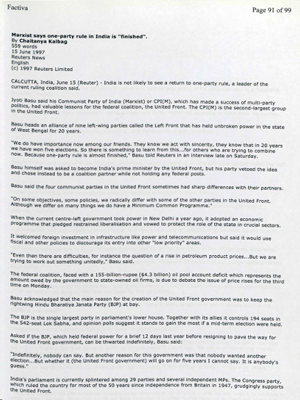Marxist says one-party rule in India is “finished”
[Reuters]
Published date: 24th Jul 1997
15 June 1997
Reuters News
English
(c) 1997 Reuters Limited
CALCUTTA, India, June 15 (Reuter) – India is not likely to see a return to one-party rule, a leader of the current ruling coalition said.
Jyoti Basu said his Communist Party of India (Marxist) or CPI(M), which has made a success of multi-party politics, had valuable lessons for the federal coalition, the United Front. The CPI(M) is the second-largest group in the United Front.
Basu heads an alliance of nine left-wing parties called the Left Front that has held unbroken power in the state of West Bengal for 20 years.
“We do have importance now among our friends. They know we act with sincerity, they know that in 20 years we have won five elections. So there is something to learn from this … for others who are trying to combine now. Because one-party rule is almost finished,” Basu told Reuters in an interview late on Saturday.
Basu himself was asked to become India’s prime minister by the United Front, but his party vetoed the idea and chose instead to be a coalition partner while not holding any federal posts.
Basu said the four communist parties in the United Front sometimes had sharp differences with their partners.
“On some objectives, some policies, we radically differ with some of the other parties in the United Front. Although we differ on many things we do have a Minimum Common Programme.”
When the current centre-left government took power in New Delhi a year ago, it adopted an economic programme that pledged restrained liberalisation and vowed to protect the role of the state In crucial sectors.
It welcomed foreign investment in infrastructure like power and telecommunications but said it would use fiscal and other policies to discourage its entry into other “low priority” areas.
“Even then there are difficulties, for instance the question of a rise in petroleum product prices … But we are trying to work out something unitedly,” Basu said.
The federal coalition, faced with a 155-billion-rupee ($4.3 billion) oil pool account deficit which represents the amount owed by the government to state-owned oil firms, is due to debate the issue of price rises for the third time on Monday.
Basu acknowledged that the main reason for the creation of the United Front government was to keep the right wing Hindu Bharatiya Janata Party (BJP) at bay.
The BJP is the single largest party in parliament’s lower house. Together with its allies it controls 194 seats in the 542-seat Lok Sabha, and opinion polls suggest it stands to gain the most if a mid-term election were held.
Asked If the BJP, which held federal power for a brief 12 days last year before resigning to pave the way for the United Front government, can be thwarted indefinitely, Basu said:
“Indefinitely, nobody can say. But another reason for this government was that nobody wanted another election … But whether it (the United Front government) will go on for five years I cannot say. It is anybody’s guess.”
India’s parliament is currently splintered among 29 parties and several independent MPs. The Congress party, which ruled the country for most of the 50 years since independence from Britain in 1947, grudgingly supports the United Front.
(c) Reuters Limited 1997






